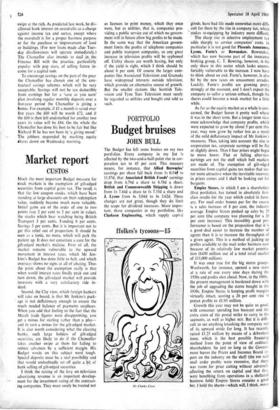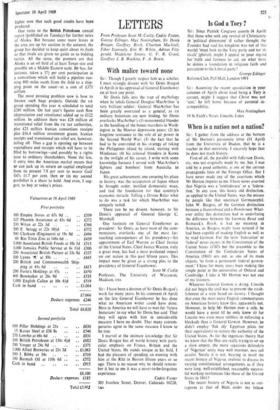Budget bruises
PORTFOLIO JOHN BULL
The Budget has left some bruises on my two portfolios. Every company in my list is affected by the two-and-a-half-point rise in cor- poration tax to 45 per cent. This measure means, for instance, that Allied Breweries' earnings per share fall back from Is 0.54d to 11.87d, that Associated British Foods' earnings drop from 6.79d a share to 6.58d a share, British and Commonwealth Shipping is down from is 7.44d a share to Is 7.33d a share and J. Lyons from 4s 5.04d to 4s 3.62d. These changes are not great, though they do limit the scope for dividend increases. More impor- tant, those companies in my portfolios, like Clarkson Engineering, which supply capital
goods, have had life made somewhat more diffi- cult for them by the rise in company tax, which makes re-equipping by industry more difficult.
The sharp rise in selective employment tax adds sharply to service companies' costs. In particular it is not good for Phoenix Assurance, Lyons, Forte's or Bowmaker. Bowmaker, - which has now become part of the insurance broking group, C. T. Bowring, however, is the only share in this sector which looks uncom- fortably vulnerable to the increase. I now have to think about an exit. Forte's, however, is also hit by the new taxes on amusement arcades. Luckily, Forte's profits are growing pretty strongly at the moment, and I don't expect the company to suffer a serious setback, though the shares could become a weak market for a little while.
As far as the equity market as a whole is con- cerned, the Budget leaves it pretty well where it was in the short term. But a longer term view must acknowledge that company profits, which were expected to grow by about 5 per cent this year, may now grow by rather less as a result of the mild deflationary impact of Mr Jenkins's measures. Thus, taking into account the rise in corporation tax, corporate earnings will be flat or slightly down. Thus I fear prices might begin to move lower. Flat or falling after-tax- earnings are not the stuff which bull markets are made of. The exemption of gilt-edged securities from capital gains tax makes that sec- tor more attractive when the inevitable recovery in prices comes and I shall be looking out for bargains.
Empire Stores, in which I am a shareholder (first portfolio), has turned in absolutely first- class results for the year which ended in Janu- ary. For mail order houses par for the course is a sales increase of 8 per cent, the industry average. Empire Stores pushed up sales by 29 per cent (the company was planning for a 20 per cent increase). This incredibly good per- formance is based on the proposition that it is a good deal easier to increase the number of agents than it is to increase the throughput of a given agent. This is a method of jacking up profits available to the mail order business now because of its relatively low market penetra- tion (£450 million out of a total retail market of £11,000 million).
It was once true for the big stores groups. Woolworth, for instance, opened a new store at a rate of one every nine days during the 1930s and profits shot ahead. Now, in the 1960s, the present management is burdened down with the job of upgrading the stores bought in the 1930s. Empire Stores is keeping profit margins -virtually intact, scoring a 26 per cent rise in pretax profits to £1.93 million. Growth this year may not be quite so good. with consumer spending less buoyant and the extra costs of the postal strike to carry in the accounts, as well as higher sEr. But it is diffi- cult to see anything knocking the company out of its upward stride for long. It has recently raised £1.25 million by means of a debenture issue, which is the best possible financing method from the point of view of ordinary shareholders. So just so long as the Govern- ment leaves the Prices and Incomes Board re- port on the industry on the shelf (the Pm said mail order profits were excessive, that there was room for price cutting without adversely -.affecting the return on capital and that they were benefiting from operations in a sheltered business field) Empire Stores remains a good bet. I hold the shares—which will, I think, move higher now that such good results have been produced.
One turns to the British Petroleum annual report (published on Tuesday) for further news of Alaska. But because some more leases in the area are up for auction in the autumn, the group has decided to keep quiet about its finds so that rivals are given no guide as to bidding tactics. All the same, the pointers are that Alaska is an oil field of at least Texan size and possibly on a Middle Eastern scale. BP has, for instance, taken a 37f per cent participation in a consortium which will build a pipeline run- ning 800 miles south from the field to a ship- ping point on the coast—at a cost of 1375 million.
The most pressing problem now is how to finance such huge projects. Outside the us group spending this year is scheduled to total £280 million. On last year's figures cash flow (depreciation and retentions) added up to f122 million. In addition there was 128 million of transitional relief from the UK tax authorities, plus £23 million Iranian consortium receipts plus £16.4 million investment grants. -Iranian receipts and transitional tax relief are, however, tailing off. Thus a gap is opening up between expenditure and receipts which will have to be filled by borrowings—and possibly by a rights issue to ordinary shareholders. None the less, if entry into the American market means that BP can jack up its return on capital employed from its present 7.8 per cent to nearer Guif Oil's 11.7 per cent, then BP (in my second portfolio) is a share to hold. And even, I sug- gest, to buy at today's prices.
Valuations at 16 April 1969 First portfolio 100 Empire Stores at 67s 9d .. £339 125 Phoenix Assurance at 43s 6d f272 330 Witan at 22s 3d £366 500 E. Scragg at 22s 10fd £572 500 Clarkson (Engineers) at 19s 9d £494 60 Rio Tinto. Zinc at 146s 6d £439 1,000 Associated British Foods at lOs 3d £513 1,000 Jamaica Public Service at 6s 1-fd £306 200 Associated British Picture at 33s 9d £337 100 Lyons 'A' at 89s £445 200 British and Commonwealth Ship- ping at 41s 6d 200 Forte's Holdings at 45s ..
400 Bowmaker at 26s 9d .. 1,000 English Calico at lOs 4fd Cash in hand .. f7,066
Deduct: expenses £246
Total £6,820 Second portfolio 600 Pillar Holdings at 2ls • • 15 Kaiser Steel at £36 8s • • 250 Lonrho at 66s 6d ..
100 British Petroleum at 136s 414 300 Vosper at 24s 9d 1,000 Allied Breweries at 21s 3d 300 J. Bibby at 34s .
100 Burmah Oil at 110s 6d ..
Cash in hand .. £6,100
Deduct: expenses £185
Total £5.915
• •
£415 £450 £535 .. £519 .. £1,064
• •
• •
.. 1630 .. £546 .. £831 1682 1371 .. £1,063 .. £510 .. 1552 .. £915











































 Previous page
Previous page